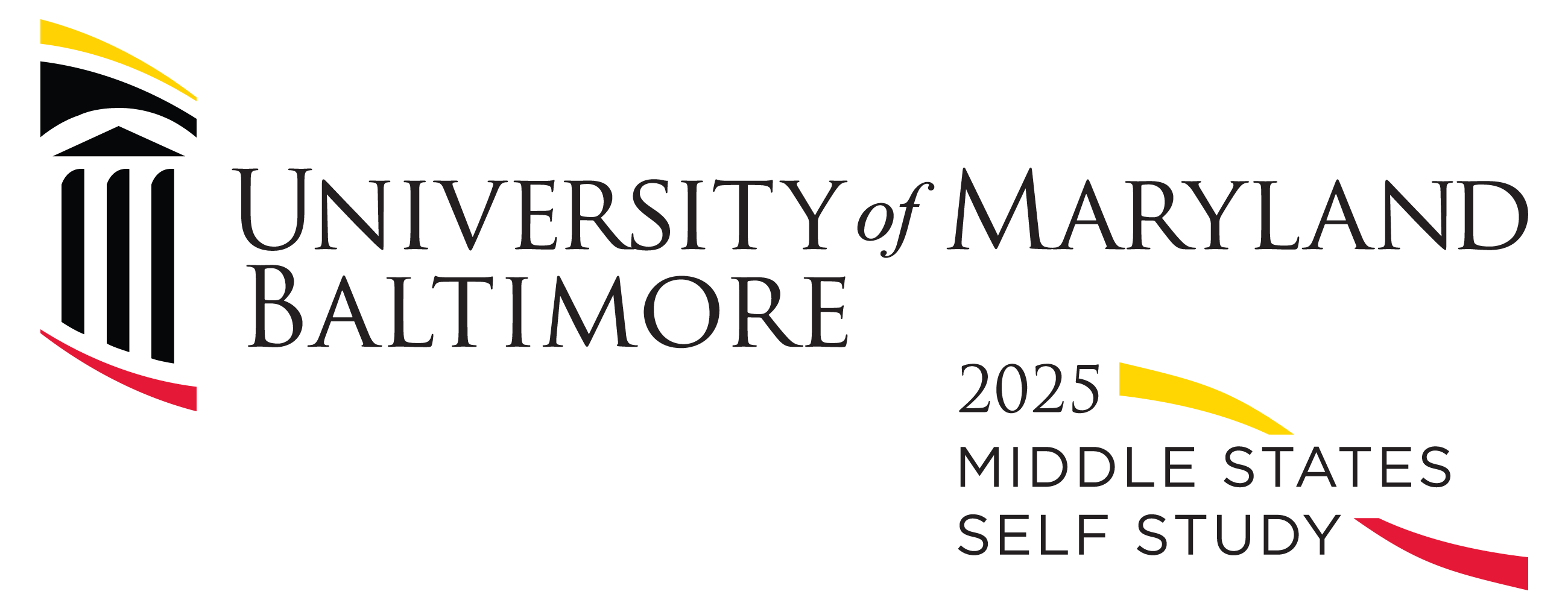Verification of Compliance Strategy
A Compliance Verification Team, formed from members of the Logistics Committee, will partner with the Working Groups to verify institutional compliance with accreditation-relevant federal, state, USM, and UMB requirements in the following areas:
- Student identity verification in distance and correspondence education
- Transfer of credit policies and articulation agreements
- Title IV program responsibilities
- Institutional records of student complaints
- Required information for students and the public
- Standing with State and other accrediting agencies
- Contractual relationships
- Assignment of credit hours
The Compliance Verification Team will be responsible for reviewing University policies and
procedures, identifying and gathering evidence, drafting a chapter demonstrating compliance in
the areas listed above, and integrating feedback to produce a final copy. Materials required for the Federal Compliance Report will be combined into a single, bookmarked PDF file.
Evaluations Team Profile
As Maryland’s public health, law, and human services University, UMB would benefit from working with a team experienced in working with institutions that have a significant majority of graduate and professional students in these disciplines.
Additionally, as UMB emphasizes interdisciplinary education and research in an atmosphere that explicitly values civility, diversity, collaboration, teamwork, and accountability, having team members who are versed in interdisciplinary education would allow the University to learn from others who share its commitments. UMB also seeks assurance that the knowledge it generates provides maximum benefit to society and directly enhances the various communities surrounding the University.
The latest Carnegie Classification of Institutions of Higher Education placed UMB in the newly created Special Focus Four Year: Research Institution category. Other institutions with this designation accredited by Middle States are the Uniformed Services University of the Health Sciences, Icahn School of Medicine at Mount Sinai, Weill Medical College of Cornell University, Rockefeller University, and Albert Einstein College of Medicine.
In addition, the following institutions accredited by Middle States share some characteristics with UMB: Rutgers University, Columbia University, University of Pennsylvania, and Thomas Jefferson University. The University of Pittsburgh Schools of the Health Sciences, including medicine, dental, nursing, pharmacy, and public health, are all highly ranked and regarded in their respective fields. The University of Pittsburgh also has schools of law and social work, and the University of Pittsburgh Medical Center is consistently honored as one of America's top hospitals. Other institutions to be considered include Georgetown University, Carnegie Mellon University, Temple University, Syracuse University, Stony Brook University, and New York University.
For the external evaluation to be of the greatest benefit to UMB in fostering the articulation and achievement of its strategic goals, it would be most helpful if the chair (or co-chairs) of the evaluation team would be a president, president emeritus, provost, or provost emeritus, dean, or distinguished faculty member of a selective, public “Research Institution” or a public or private institution with an extensive portfolio of graduate and professional schools.
Strategies for Managing the Evidence Inventory
Naming conventions and archiving strategies will be developed and managed by the
Logistics Committee. Working Group chairs will have editing privileges for the staging area and will be responsible for adding and curating material for their standard. The Working Group liaison and the Logistics Committee liaison will also have editing privileges. Each member of the Working Group will have read and comment access to their Working Group area.
Each Logistics Committee liaison will be responsible for moving material from the staging area to the evidence inventory to minimize risk of accidental deletion or misplacement as well as to ensure documents are properly inventoried and tagged.
Global editing access to the evidence inventory will be extended to the Steering Committee chairs as well as the members of the Logistics Committee. Global read and comment access will be extended to all members of the Steering Committee.
Lastly, to the extent possible, the Logistics Committee members will pre-populate the evidence inventory with relevant documents and reports.



